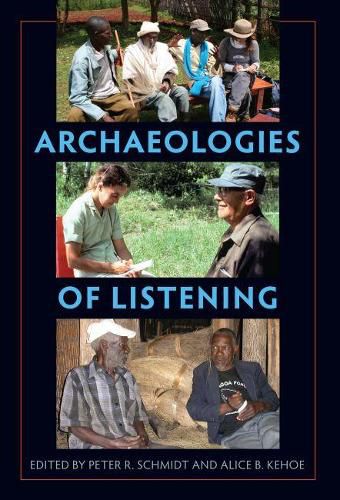Readings Newsletter
Become a Readings Member to make your shopping experience even easier.
Sign in or sign up for free!
You’re not far away from qualifying for FREE standard shipping within Australia
You’ve qualified for FREE standard shipping within Australia
The cart is loading…






This title is printed to order. This book may have been self-published. If so, we cannot guarantee the quality of the content. In the main most books will have gone through the editing process however some may not. We therefore suggest that you be aware of this before ordering this book. If in doubt check either the author or publisher’s details as we are unable to accept any returns unless they are faulty. Please contact us if you have any questions.
Archaeologists tend to rely on scientific methods to reconstruct past histories, an approach that can alienate local indigenous populations and limit the potential of archaeological research. Essays in this volume argue that listening to and learning from local and descendant communities is vital for interpreting the histories and heritage values of archaeological sites.
Case studies from around the world demonstrate how a humanistic perspective with people-centric practice decolonizes the discipline by unlocking an intellectual space and collaborative role for indigenous people. These examples show how listening to oral traditions has opened up broader understandings of ancient rituals in Tanzania-where indigenous knowledge paved the way to significant archaeological finds about local iron technology. Archaeologists working with owners of traditional food ovens in Northern Australia discovered the function of mysterious earth mounds nearby, and the involvement of local communities in the interpretation of the Sigiriya World Heritage Site in Sri Lanka led to a better understanding of indigenous values. The ethical implications for positioning archaeology as a way to bridge divisions are also explored. In a case study from Northern Ireland, researchers risked sparking further conflict by listening to competing narratives about the country’s political past, and a study of archival records from nineteenth-century grave excavations in British Columbia, where remains were taken without local permission, reveals why indigenous people in the region still regard archaeology with deep suspicion.
The value of cultural apprenticeship to those who have long-term relationships with the landscape is nearly forgotten today, contributors argue. This volume points the way to a reawakening of the core principles of anthropology in archaeology and heritage studies.Contributors: Peter Schmidt | Alice Kehoe | Kathryn Weedman Arthur | Catherine Carlson | Billy O Foghlu | Audrey Horning | Steve Mrozowski | George Nicholas | Innocent Pikirayi | Jonathan Walz | Camina Weasel Moccasin | Jagath Weerasinghe
$9.00 standard shipping within Australia
FREE standard shipping within Australia for orders over $100.00
Express & International shipping calculated at checkout
This title is printed to order. This book may have been self-published. If so, we cannot guarantee the quality of the content. In the main most books will have gone through the editing process however some may not. We therefore suggest that you be aware of this before ordering this book. If in doubt check either the author or publisher’s details as we are unable to accept any returns unless they are faulty. Please contact us if you have any questions.
Archaeologists tend to rely on scientific methods to reconstruct past histories, an approach that can alienate local indigenous populations and limit the potential of archaeological research. Essays in this volume argue that listening to and learning from local and descendant communities is vital for interpreting the histories and heritage values of archaeological sites.
Case studies from around the world demonstrate how a humanistic perspective with people-centric practice decolonizes the discipline by unlocking an intellectual space and collaborative role for indigenous people. These examples show how listening to oral traditions has opened up broader understandings of ancient rituals in Tanzania-where indigenous knowledge paved the way to significant archaeological finds about local iron technology. Archaeologists working with owners of traditional food ovens in Northern Australia discovered the function of mysterious earth mounds nearby, and the involvement of local communities in the interpretation of the Sigiriya World Heritage Site in Sri Lanka led to a better understanding of indigenous values. The ethical implications for positioning archaeology as a way to bridge divisions are also explored. In a case study from Northern Ireland, researchers risked sparking further conflict by listening to competing narratives about the country’s political past, and a study of archival records from nineteenth-century grave excavations in British Columbia, where remains were taken without local permission, reveals why indigenous people in the region still regard archaeology with deep suspicion.
The value of cultural apprenticeship to those who have long-term relationships with the landscape is nearly forgotten today, contributors argue. This volume points the way to a reawakening of the core principles of anthropology in archaeology and heritage studies.Contributors: Peter Schmidt | Alice Kehoe | Kathryn Weedman Arthur | Catherine Carlson | Billy O Foghlu | Audrey Horning | Steve Mrozowski | George Nicholas | Innocent Pikirayi | Jonathan Walz | Camina Weasel Moccasin | Jagath Weerasinghe